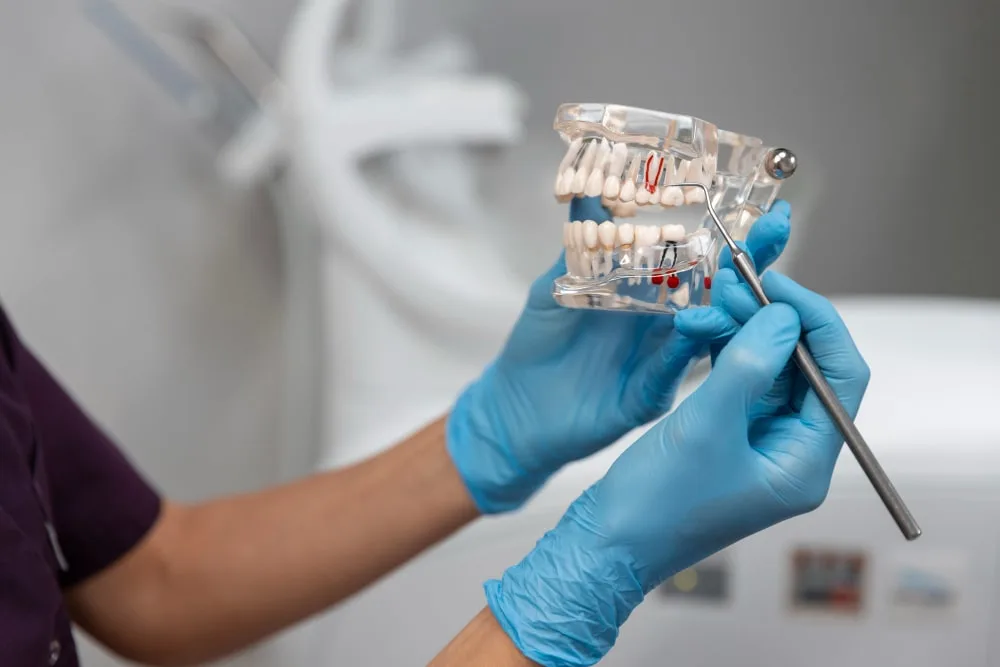Dental implants are an investment in your long-term oral health. Designed to fuse securely with your jawbone, implants provide a stable, natural-looking foundation or support the health of nearby teeth. Whether you’re missing one tooth or several, a well-placed implant restores both function and confidence without the downsides of traditional bridges or removable appliances.
While root canals can save a natural tooth, they have their own limitations. If the tooth is already compromised, cracked, deeply decayed, or previously treated, a root canal may only offer a short-term fix before further issues arise. At Orchid Periodontics and Dental Implants, we don’t believe in one-size-fits-all. That’s why Dr. Javadi evaluates every case herself and helps you select the treatment that aligns with your goals.
Key Differences Between Root Canals and Dental Implants
The key differences between root canals and dental implants include:
- Tooth Preservation: A root canal preserves your natural tooth by removing the infection from inside and sealing it, which is ideal when the tooth is structurally sound. A dental implant, on the other hand, replaces the entire tooth, including the root, with a titanium post and crown, which is preferred when the natural tooth cannot be reliably saved.
- Treatment Timeline: Root canals are typically faster, often completed in one or two visits, followed by crown placement. Dental implants follow a staged process, implant placement, bone healing over several months, and final crown attachment, making treatment longer but ensuring stability and lasting results.
- Risk of Future Problems: Root-canaled teeth can still fracture or develop decay around the crown, especially if the tooth was already compromised. Implants are immune to cavities and don’t rely on weakened tooth structure, reducing the chances of future retreatment or failure.
- Impact on Surrounding Teeth: Root canals preserve the original tooth and don’t affect neighboring teeth. Implants also leave adjacent teeth untouched, unlike dental bridges, which may require filing down healthy neighboring teeth for support.
- Bone Health and Longevity: While root canals maintain the visible tooth, they don’t prevent bone loss in the jaw over time. Implants actively preserve bone density by mimicking the stimulation of a natural root, helping maintain facial structure and bite alignment.
Benefits of Implants Over Root Canals
Root canals can be effective when the tooth is healthy enough to support long-term restoration. But in cases where the tooth is beyond repair, dental implants often provide a more predictable and lasting outcome. Rather than preserving a weakened structure, implants offer a fresh foundation built to last.
Dr. Javadi recommends choosing implants over root canals in the following cases:
Implants Replace Weak Teeth Entirely
Implants replace the entire tooth, making them ideal when a natural tooth is cracked, decayed, or previously treated. They don’t rely on compromised roots or fragile enamel, offering a stable, long-term alternative that doesn’t carry the same risk of future failure or breakdown.
No Risk of Reinfection or Decay
Root-canaled teeth can still develop cavities or become reinfected, especially if the crown leaks or the tooth was already weak. Dental implants are immune to decay and eliminate the need for repeat procedures due to infection, making them a cleaner, lower-risk option in many complex cases.
Maintains Bone and Facial Support
Tooth loss often leads to bone shrinkage and changes in facial shape. Unlike root canals, which preserve the tooth but not the bone, implants stimulate the jawbone to maintain volume and structure, preserving your natural contours and preventing premature facial aging over time.
Better Long-Term Value
Though implants can cost more upfront, they usually last longer and require fewer follow-ups. Root canals may fail or need retreatment, especially in already damaged teeth. Over time, many patients find implants to be more cost-effective, hassle-free, and less likely to lead to future problems.
How To Determine if You Are a Good Candidate for Dental Implants?
Most healthy adults with missing, failing, or non-restorable teeth are strong candidates for dental implants, but certain factors affect success. Dr. Javadi carefully evaluates your individual case to ensure the implant is the safest and most effective long-term solution.
You may be a candidate if you:
- Have a missing or severely damaged tooth that cannot be saved
- Have healthy gums and no active periodontal disease
- Have enough bone volume in the jaw to support an implant (or are open to bone grafting)
- Are in good general health (well-managed diabetes, no uncontrolled conditions)
- Do not smoke, or are willing to stop before and after surgery
- Want a long-term, low-maintenance solution that functions like a natural tooth
You may need additional planning if you:
- Have extensive bone loss in the jaw (bone grafting may be required)
- Have uncontrolled diabetes or other systemic conditions that affect healing
- Smoke regularly or have habits that interfere with gum healing
- Have an active gum infection or untreated periodontal disease
Choosing between a root canal and a dental implant isn’t just about resolving the current issue; it’s about planning for the long-term health, comfort, and stability of your smile. While root canals can be effective in the right circumstances, they rely on the condition of a compromised tooth and may lead to retreatment if the tooth is too damaged.
Dental implants, on the other hand, remove uncertainty by offering a clean and stable solution that replaces the entire tooth and helps prevent future complications.
Are you trying to decide between a dental implant and a root canal in Edmonds and nearby areas? Dr. Javadi can help you understand the difference between the procedures and provide a long-lasting solution that can help you make the best choice for your comfort.
Call (425) 775-2002 and book your appointment today.




